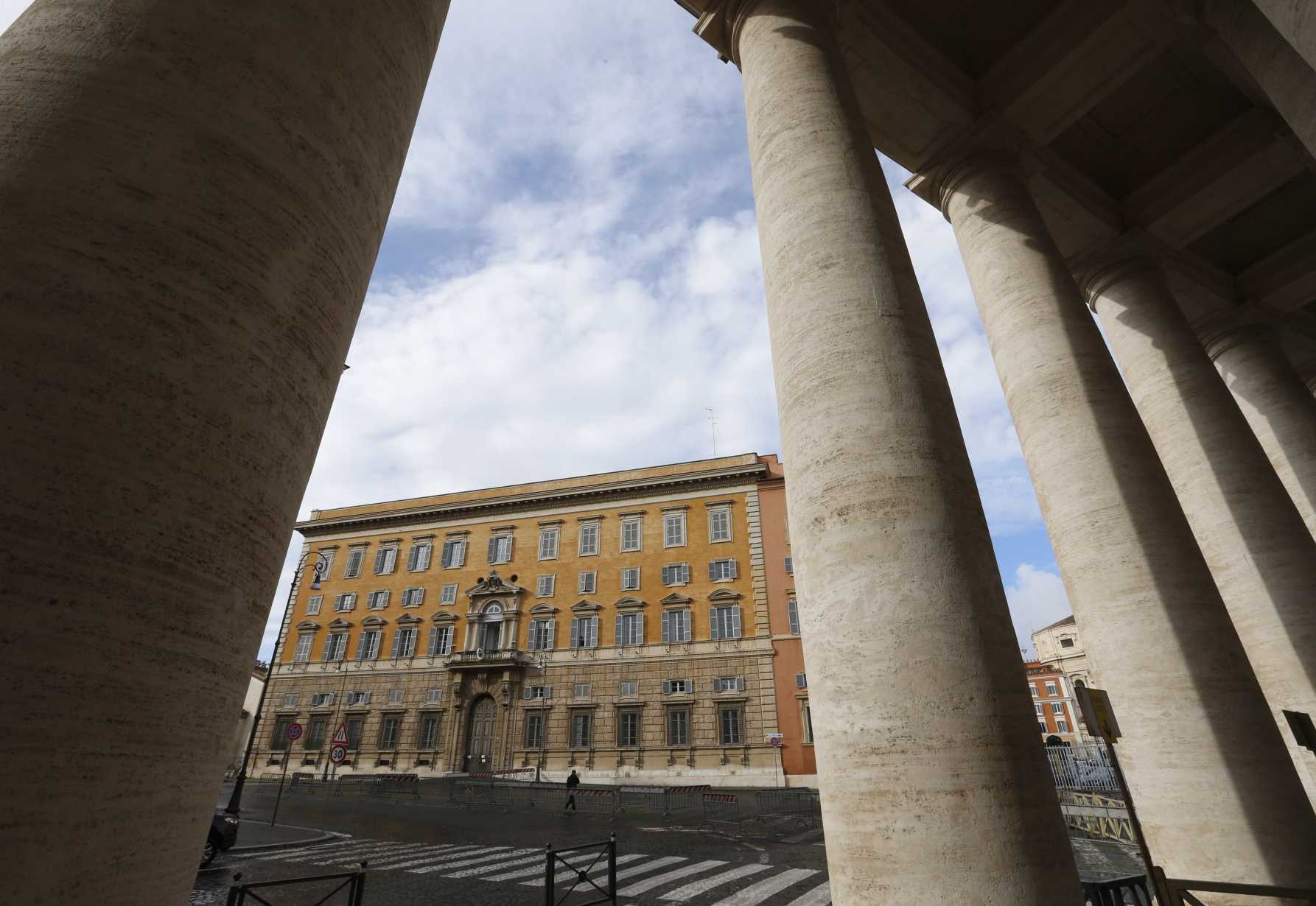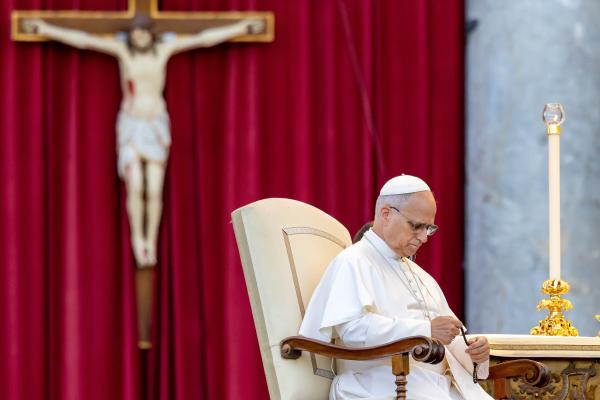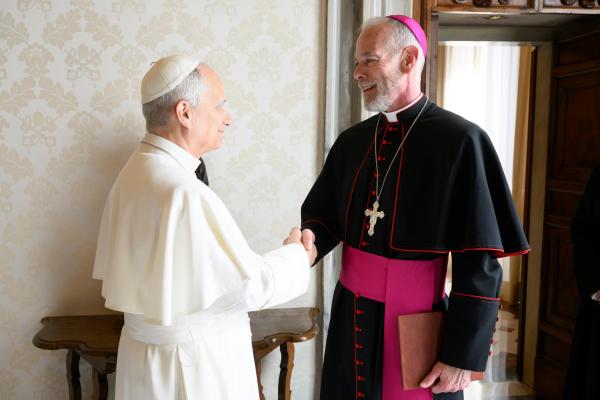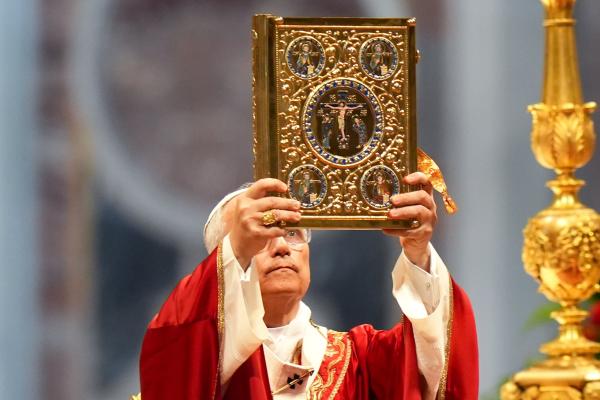Vatican publishes new norms to discern alleged supernatural phenomena
Cardinal Víctor Manuel Fernández, prefect of the Dicastery for the Doctrine of the Faith, laid out six possible conclusions that can be reached when discerning a possible supernatural phenomenon, ranging from a declaration that an event is not of supernatural origin to authorizing and promoting piety and devotion associated with a phenomenon without affirming its divine nature.
 Justin McLellan
Justin McLellan

The headquarters of the Dicastery for the Doctrine of the Faith is seen through the colonnade at the Vatican Feb. 15, 2022. (CNS photo/Paul Haring)
VATICAN CITY (CNS) -- The Vatican has published new norms for the church to discern alleged supernatural phenomena, such as Marian apparitions and mystical visions, which streamline the discernment process for bishops, allow the Vatican to avoid making definitive judgments on the authenticity of the events and reaffirm that Catholics are not obliged to believe in the purported phenomena.
In the document released May 17, Cardinal Víctor Manuel Fernández, prefect of the Dicastery for the Doctrine of the Faith, laid out six possible conclusions that can be reached when discerning a possible supernatural phenomenon, ranging from a declaration that an event is not of supernatural origin to authorizing and promoting piety and devotion associated with a phenomenon without affirming its divine nature.
The significant development in the text, signed by Pope Francis, is that "as a rule, neither the Diocesan Bishop, nor the Episcopal Conferences, nor the Dicastery will declare that these phenomena are of supernatural origin," though "the Holy Father can authorize a special procedure in this regard."
Rather, declarations of supernatural authenticity "are replaced either by a 'nihil obstat'" -- a judgment meaning "no objection" that finds no problematic elements with a reported phenomenon -- "or by another determination that is suited to the specific situation," Cardinal Fernández wrote in his presentation of the new norms.
If a "nihil obstat" is issued in response to alleged supernatural phenomena, "the Diocesan Bishop is encouraged to appreciate the pastoral value of this spiritual proposal, and even to promote its spread, including possibly through pilgrimages to a sacred site," but "without expressing any certainty about the supernatural authenticity of the phenomenon itself," the guidelines said.
Other conclusions may require bishops: to further discern events that have positive aspects but also some signs of confusion; to intervene directly against people who are misusing a phenomenon for personal gain; to publicly forbid adherence to a phenomenon deemed to have serious risks; or declare that a phenomenon is decidedly not supernatural based on concrete evidence or proof that it was false.
Another conclusion specifically addresses phenomena with "various or significant" negative or "critical elements" but have "already spread widely" and have led to verifiable spiritual fruits. "In this situation, a ban that could upset the People of God is not recommended," the guidelines said. "Nevertheless, the Diocesan Bishop is asked not to encourage this phenomenon but to seek out alternative expressions of devotion and possibly reorient its spiritual and pastoral aspects."
Cardinal Fernández wrote that the possibility of concluding the discernment process with a "nihil obstat," as opposed to declaring the phenomenon is true and worthy of belief, is meant to "prevent any further delays in the resolution of a specific case involving an event of alleged supernatural origin."
He also cited historical instances of bishops issuing definitive statements that appear to oblige the faithful in their dioceses to believe the authenticity of certain supernatural phenomena.
"These expressions conflicted with the Church's own conviction that the faithful did not have to accept the authenticity of these events," the cardinal wrote, and they "effectively oriented the faithful to think they had to believe in these phenomena, which sometimes were valued more than the Gospel itself."
Citing Pope Benedict XVI, Cardinal Fernández wrote that a "nihil obstat" allows the faithful to believe certain phenomena "in a prudent manner" but that their devotion "is not obligatory."
The cardinal said such a response "naturally leaves open the possibility that, in monitoring how the devotion develops, a different response may be required in the future."
The document explained that the procedures for discerning alleged supernatural phenomena previously followed were approved by St. Paul VI in 1978, more than four decades ago, and remained confidential until they were officially published in 2011.
Yet since those norms were put into practice, "it became evident that decisions took an excessively long time, sometimes spanning several decades," it said, noting that "since 1950, no more than six cases have been officially resolved, even though such phenomena have increased without clear guidance and with the involvement of people from many Dioceses."
"This way of proceeding, which has caused considerable confusion, shows how the 1978 Norms are no longer adequate to guide the actions of the Bishops and the Dicastery," the cardinal wrote.
In its introduction, the document also noted that with "the advent of modern means of communication, these phenomena can attract the attention of many believers or cause confusion among them."
A revision process of the 1978 norms began in 2019, and the current document began being prepared in 2023, it said.
The document laid out procedures for bishops to follow in investigating supernatural phenomena in their territory and explained their responsibility to formulate a final judgment on them, from among the six conclusions provided, to be sent to the dicastery for approval. In fact, the new norms assure bishops that the dicastery will be more explicitly involved in working with them if they need to conduct an investigation. The bishop's decision must be sent first to the dicastery before it is made public and the dicastery will have the power to intervene at any time.
The procedures said that a bishop must "refrain from making any public statements in favor of the authenticity or supernatural nature of such phenomena, and from having any personal connection with them."
If forms of devotion arise in connection with an alleged supernatural event, "the Diocesan Bishop has the serious obligation of initiating a comprehensive canonical investigation as soon as possible to safeguard the Faith and prevent abuses," the document said.
The bishop should also "prevent the spread of confused religious manifestations or the dissemination of any materials pertaining to the alleged supernatural phenomenon -- such as the weeping of sacred images; the sweating, bleeding, or mutation of consecrated hosts, etc. -- to avoid fueling a sensationalistic climate," it said.
Outlining the norms for the investigative phase, the document said the positive criteria to consider in response to a supernatural phenomenon entail the credibility of persons involved with the events, the doctrinal orthodoxy of the phenomenon and messages associated with it, the spontaneity of the event and the fruits that it bears in the life of the Christian community.
Negative criteria, on the other hand, involve potential doctrinal errors associated with the event, the rise of a sectarian spirit revolving around it, an overt pursuit of personal gain or gravely immoral actions committed by those involved in the phenomenon and psychological or psychopathic tendencies among those who may have been influenced by the phenomenon.
If a bishop is granted a "nihil obstat" by the dicastery regarding an alleged supernatural phenomenon, the document said a bishop will indicate that the faithful "are authorized to give to it their adherence in a prudent manner," while ensuring they "do not consider any of the determinations as an approval of the supernatural nature of the phenomenon itself."
If a precautionary or negative determination is made, the bishop "must formally make it known," using clear and understandable language and considering whether to make known the doctrinal reasons for the decision, the norms said.



